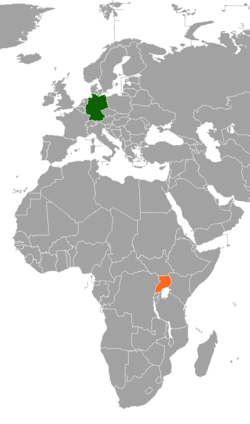History
On February 27, 1890, the Uganda Treaty between the German colonialist Carl Peters and the King (Kabaka) Mwanga II of Buganda was signed. The treaty was to expand German East Africa to areas north of Lake Victoria. However, with the later Helgoland-Zanzibar Treaty, the Uganda Treaty lost its importance and Uganda became the British Protectorate of Uganda. [2]
In 1962, the Federal Republic of Germany (FRG) and Uganda, which had become independent, established diplomatic relations. Heinz Wersdörfer became the first ambassador of the FRG in Uganda. Two years later, the first projects in the bilateral development partnership were started. In 1973, diplomatic relations were established with the German Democratic Republic (GDR) by Uganda. [1]
In 1976, the Entebbe International Airport became the scene of Operation Entebbe, in which an Israeli commando freed hostages from the hands of Palestinian and German hijackers. The Ugandan dictator at the time Idi Amin had supported the kidnappers, which put a strain on relations with the West. [3]
In 2000 the Deutsch-Ugandische Gesellschaft e.V. was founded in Heilbronn. In 2007 the Federal Ministry for Economic Cooperation and Development declared Uganda a priority country for German development aid. [2]
This page is based on this
Wikipedia article Text is available under the
CC BY-SA 4.0 license; additional terms may apply.
Images, videos and audio are available under their respective licenses.


